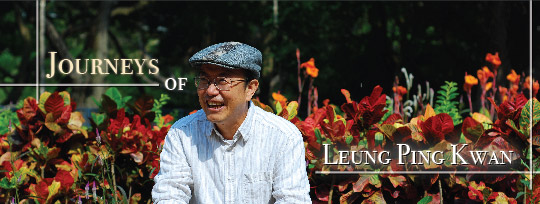
About the Collection

Leung Ping Kwan (1949-2013), widely known by the pen name Yasi, was a leading Hong Kong poet, novelist, essayist, academic and photographer. He left Hong Kong in the late 1970s to pursue his studies in the US, with special focus on the relations between modern Chinese poetry and Western modernism. Upon his return, he taught at The University of Hong Kong and later at Lingnan University. He devoted his whole life to writing, research and teaching.
Spanning five decades, Leung Ping Kwan’s writing career began in the early 1960s. He wrote in a variety of genres, and his works have been extensively translated into a number of languages, including English, French, German, Portuguese, Swedish, Japanese and Korean. He also tried his hand at other art forms, including photography and film, and throughout his life he had entered into countless dialogues with photographers, visual artists, choreographers, musicians, fashion designers and dramatists, among many others.
Leung Ping Kwan received numerous major awards for his work, including the “Award for Best Artist (Literary Arts)” from the Hong Kong Arts Development Council in 2010 and “Author of the Year” at the Hong Kong Book Fair in 2012. He passed away in the morning of 5 January 2013 at the age of 63.
In association with the Art Promotion Office, the Hong Kong Fringe Club held the exhibition “Leung Ping Kwan (1949-2013), a Retrospective” in early 2014, and the two organisations teamed up again to organise “Journeys of a Hong Kong Poet, Leung Ping Kwan (1949-2013)” during “Hong Kong Week 2014” in Taipei in November the same year to introduce this prominent writer, academic and cultural figure from Hong Kong, together with works by local and overseas artists, to Taiwanese audiences.
This collection, consisting of major poems and works of art that were showcased in the two exhibitions, selected and arranged in sections that follow seven key themes in Leung Ping Kwan’s creative journey, gives readers an insight into the important contributions that he made to literature, art and the culture in Hong Kong, while allowing them to appreciate contemporary Hong Kong literature and visual arts at the same time.
About the Collection

Leung Ping Kwan (1949-2013), widely known by the pen name Yasi, was a leading Hong Kong poet, novelist, essayist, academic and photographer. He left Hong Kong in the late 1970s to pursue his studies in the US, with special focus on the relations between modern Chinese poetry and Western modernism. Upon his return, he taught at The University of Hong Kong and later at Lingnan University. He devoted his whole life to writing, research and teaching.
Spanning five decades, Leung Ping Kwan’s writing career began in the early 1960s. He wrote in a variety of genres, and his works have been extensively translated into a number of languages, including English, French, German, Portuguese, Swedish, Japanese and Korean. He also tried his hand at other art forms, including photography and film, and throughout his life he had entered into countless dialogues with photographers, visual artists, choreographers, musicians, fashion designers and dramatists, among many others.
Leung Ping Kwan received numerous major awards for his work, including the “Award for Best Artist (Literary Arts)” from the Hong Kong Arts Development Council in 2010 and “Author of the Year” at the Hong Kong Book Fair in 2012. He passed away in the morning of 5 January 2013 at the age of 63.
In association with the Art Promotion Office, the Hong Kong Fringe Club held the exhibition “Leung Ping Kwan (1949-2013), a Retrospective” in early 2014, and the two organisations teamed up again to organise “Journeys of a Hong Kong Poet, Leung Ping Kwan (1949-2013)” during “Hong Kong Week 2014” in Taipei in November the same year to introduce this prominent writer, academic and cultural figure from Hong Kong, together with works by local and overseas artists, to Taiwanese audiences.
This collection, consisting of major poems and works of art that were showcased in the two exhibitions, selected and arranged in sections that follow seven key themes in Leung Ping Kwan’s creative journey, gives readers an insight into the important contributions that he made to literature, art and the culture in Hong Kong, while allowing them to appreciate contemporary Hong Kong literature and visual arts at the same time.














